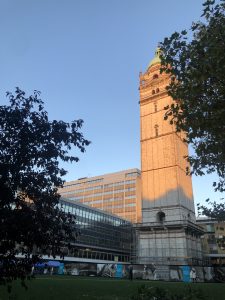
Anne-Sophie Korotov recently completed her MEng Materials Science and Engineering degree in June 2024. MEng Materials Science and Engineering is a four-year degree in the Department of Materials at Imperial College London, which involves a thesis project in the final year.
In this blog post, she shares her insights and offers advice for future students. Anne-Sophie is now completing a PhD at the University of Oxford.
My Master’s project was one of my first long-term scientific projects during this degree, which I had to navigate by myself. Here are five things that helped me with completing my MEng project:
- Agree on a clear project structure with your supervisor
Doing a project by yourself for six months can seem like a daunting task. Breaking it down into smaller parts can help you focus on one thing at a time and organise your time better. For example, my project had two main parts: the structural and morphological characterisation of the thin films that I synthesised, and the fabrication and characterisation of memristive devices. I decided to focus on the first part of my project during the first term and the second part during the second term. Other students did the bulk of their lab work in the first term and focused on data analysis in the second, as they had more lectures during the second term, or vice versa.
- Catch up with your group and supervisor frequently
Your supervisor is there to support you and to help you with understanding your results. Frequent catch-ups can prevent you from going down the wrong path and having to re-do a lot of experiments. You can also send them drafts of your literature review and thesis for feedback. Moreover, input from the group can be very helpful, so attending and presenting at group meetings is a great way to progress in your research. Often other members of the group know about helpful papers or tips on how to improve your experimental technique. Plus, it is a great way to practice presenting your results in a clear and structured manner!
- Document everything
During undergraduate labs, you are always told to keep a lab book, but sticking to it can be difficult, especially when there is so much to do in the lab. However, documenting every step you take during your project and making sure you document what happens to every sample you produce in detail can be very helpful when doing your data analysis. Often tiny changes in the experimental procedure can lead to big differences in your data. When writing your thesis it will be easier to understand where differences between similar samples stem from when you can look up the experimental procedures you followed for each sample. This will also help you stay consistent between experiments and choose the same experimental set-up every time, even when weeks pass between experiments.
- Organise your samples and data properly
Following up on documenting everything, organisation of your data and samples is key. Have a clear naming convention for each of your samples, and keep a document where you log when each sample was produced (and potentially if there was any deviation from the standard conditions). After you have collected your data, make sure to organise it in folders and with dates, so you can look up what you did on what day in your lab book. Make separate folders for data that you would like to include in your reports and presentations so that you don’t spend hours looking for it the night before your thesis is due!
- Practice your presentation (a lot!)
Since your final presentation will be in front of a panel of lecturers, who may not be an expert in your field, it is important that you can explain your project in terms simple enough for everyone to understand. It is often difficult to judge what is and what is not considered general knowledge, especially when you have dedicated the majority of your time to a single project over the past six months.
I found that practising your presentation with your research group will ensure that all your data is sensible and that what you say is factually correct. They will also be able to ask you challenging questions to prepare for the discussion after your presentation. However, your research group likely knows a lot about your topic and will not have difficulty understanding the content of your presentation. So practising with your friends from your course will give you a better understanding of whether your content is accessible to the panel.
Lastly, if you want to make sure that everyone understands what you are talking about, practice in front of family or friends with a non-material science background! Often they will ask great questions that can help you gauge your understanding of the topic as well!

 3. Believe in yourself
3. Believe in yourself